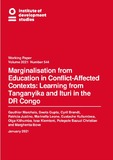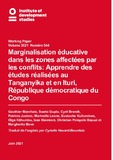Marginalisation from Education in Conflict-Affected Contexts: Learning from Tanganyika and Ituri in the DR Congo
Marginalisation éducative dans les zones affectées par les conflits: Apprendre des études réalisées au Tanganyika et en Ituri, République démocratique du Congo
| dc.contributor.author | Marchais, Gauthier | |
| dc.contributor.author | Gupta, Sweta | |
| dc.contributor.author | Brandt, Cyril Owen | |
| dc.contributor.author | Justino, Patricia | |
| dc.contributor.author | Leone, Marinella | |
| dc.contributor.author | Kuliumbwa, Eustache | |
| dc.contributor.author | Kithumbu, Olga | |
| dc.contributor.author | Kiemtoré, Issa | |
| dc.contributor.author | Christian, Polepole Bazuzi | |
| dc.contributor.author | Bove, Margherita | |
| dc.coverage.spatial | Democratic Republic of Congo | en |
| dc.date.accessioned | 2021-01-29T14:29:08Z | |
| dc.date.available | 2021-01-29T14:29:08Z | |
| dc.date.issued | 2021-01-29 | |
| dc.identifier.citation | Marchais, G. et al. (2021) Marginalisation from Education in Conflict-Affected Contexts: Learning from Tanganyika and Ituri in the DR Congo, IDS Working Paper 544, Brighton: Institute of Development Studies, DOI: 10.19088/IDS.2021.017 | en |
| dc.identifier.citation | fr | |
| dc.identifier.citation | Marchais, G. et al. (2021) Marginalisation éducative dans les zones affectées par les conflits: Apprendre des études réalisées au Tanganyika et en Ituri, République démocratique du Congo, IDS Working Paper 544, Brighton: Institute of Development Studies, DOI: 10.19088/IDS.2021.048 | |
| dc.identifier.isbn | 978-1-78118-761-6 | |
| dc.identifier.issn | 2040-0209 | |
| dc.identifier.uri | https://opendocs.ids.ac.uk/opendocs/handle/20.500.12413/15932 | |
| dc.description.abstract | This Working Paper analyses how violent conflict can enhance or reduce pre-existing forms of marginalisation and second, how new forms of marginalisation emerge as a result of violent conflict. To do so, we focus on the province of Tanganyika in the DRC, where the so-called ‘Twa-Bantu’ violent conflict has been disrupting the education sector since 2012, and secondarily on the province of Ituri, which has been affected by repeated armed conflicts since the 1990s. We use a mixed methods approach, combining quantitative data collection methods and several months of qualitative fieldwork. The study shows that the political marginalisation of ethno-territorial groups is key in understanding marginalisation from education in contexts of protracted conflict. Our results show that the Twa minority of Tanganyika has not only been more exposed to violence during the Twa-Bantu conflict, but also that exposure to violence has more severe effects on the Twa in terms of educational outcomes. We analyse key mechanisms, in particular spatial segregation, and the social segregation of schools along ethnic/identity lines. We also analyse the interaction between ethno-cultural marginalisation and economic, social and gender-related marginalisation. | en |
| dc.description.abstract | Ce document de travail regroupe, avec un autre document de travail, l'essentiel des résultats issus du projet de recherche REALISE. Le projet de recherche REALISE fait partie du programme éducatif REALISE, financé par le Foreign, Commonwealth & Development Office (FCDO) du Royaume-Uni et mis en œuvre par Save the Children, en partenariat avec World Vision. Le volet recherche est dirigé par l'Institute of Development Studies, en partenariat avec Marakuja Kivu Research, une association de recherche à but non lucratif basée à Goma, en RDC. Ce document de travail analyse d'abord comment les conflits violents peuvent renforcer ou réduire les formes préexistantes de marginalisation puis dans quelle mesure l'émergence de nouvelles formes de marginalisation résulte d'un conflit violent. Pour ce faire, nous nous concentrons sur la province du Tanganyika en RDC, où le conflit violent dit " Twa-Bantou " entraine des perturbations dans le domaine de l'éducation depuis 2012, et secondairement sur la province de l'Ituri, qui a été affectée par des conflits armés répétés depuis les années 1990. Nous utilisons une approche de méthodes mixtes, combinant des méthodes de collecte de données quantitatives et plusieurs mois de travail de terrain qualitatif. L'étude montre que la marginalisation politique des groupes ethno-territoriaux est un point clé pour comprendre la marginalisation éducative dans les contextes de conflits prolongés. Premièrement, parce que la marginalisation éducative est à la fois le résultat et le moteur de la marginalisation historique des groupes ethno-territoriaux et identitaires. Deuxièmement, parce que certains groupes peuvent être plus gravement touchés par les conflits violents. Nos résultats montrent que la minorité Twa du Tanganyika a non seulement été plus exposée à la violence pendant le conflit Twa-Bantou, mais aussi que l'exposition à la violence a des effets plus graves sur les Twa en termes de résultats scolaires. Nous analysons les mécanismes clés, en particulier la ségrégation spatiale et la ségrégation sociale des écoles selon des critères ethniques/identitaires. Nous analysons également l'interaction entre la marginalisation ethnoculturelle et la marginalisation économique, sociale et liée au genre. | fr |
| dc.description.sponsorship | Foreign, Commonwealth & Development Office | en |
| dc.language.iso | en | en |
| dc.publisher | Institute of Development Studies | en |
| dc.relation.ispartofseries | IDS Working Paper;544 | |
| dc.rights | This is an Open Access paper distributed under the terms of the Creative Commons Attribution 4.0 International licence (CC BY), which permits unrestricted use, distribution, and reproduction in any medium, provided the original authors and source are credited and any modifications or adaptations are indicated. | en |
| dc.rights.uri | http://creativecommons.org/licenses/by/4.0/ | en |
| dc.subject | Children and Youth | en |
| dc.subject | Education | en |
| dc.subject | Security and Conflict | en |
| dc.title | Marginalisation from Education in Conflict-Affected Contexts: Learning from Tanganyika and Ituri in the DR Congo | en |
| dc.title | Marginalisation éducative dans les zones affectées par les conflits: Apprendre des études réalisées au Tanganyika et en Ituri, République démocratique du Congo | fr |
| dc.type | IDS Working Paper | en |
| dc.rights.holder | Institute of Development Studies | en |
| dc.identifier.team | Conflict | en |
| dc.identifier.doi | 10.19088/IDS.2021.017 | |
| dc.identifier.doi | 10.19088/IDS.2021.048 | |
| rioxxterms.funder | Default funder | en |
| rioxxterms.identifier.project | Default project | en |
| rioxxterms.version | VoR | en |
| rioxxterms.versionofrecord | 10.19088/IDS.2021.017 | en |
| rioxxterms.funder.project | 9ce4e4dc-26e9-4d78-96e9-15e4dcac0642 | en |
Files in this item
This item appears in the following Collection(s)
-
IDS Research [1671]
Except where otherwise noted, this item's license is described as This is an Open Access paper distributed under the terms of the Creative Commons Attribution 4.0 International licence (CC BY), which permits unrestricted use, distribution, and reproduction in any medium, provided the original authors and source are credited and any modifications or adaptations are indicated.



